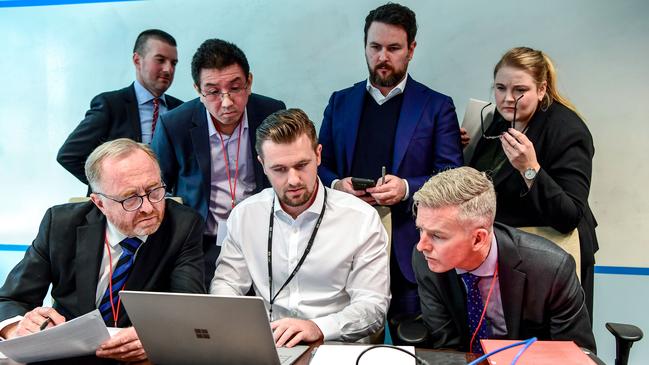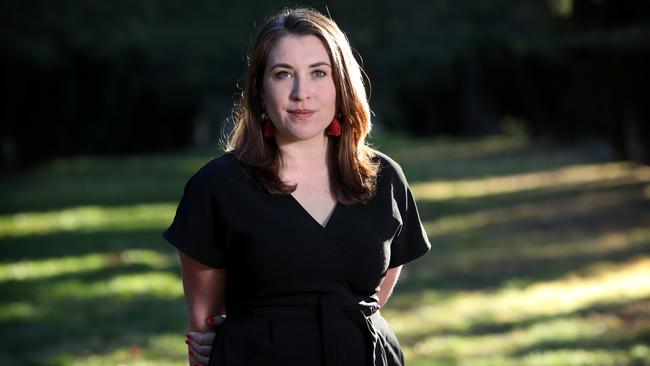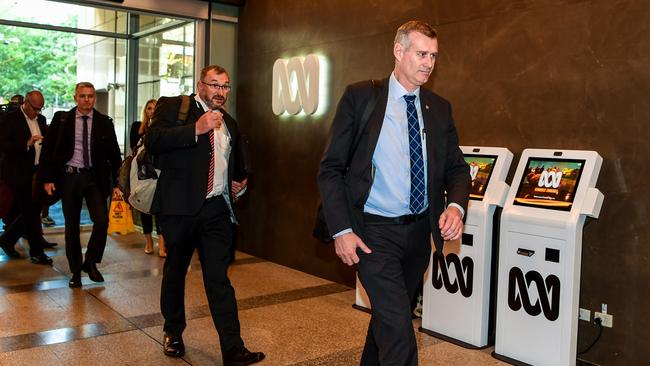Scott Morrison says government was not involved in police raids on Annika Smethurst or ABC
Scott Morrison has distanced his government from a series of police raids on a News Corp journalist and the ABC.

Scott Morrison has distanced his government from a series of Australian Federal Police raids targeting a News Corp journalist and the ABC in recent days and sympathised that the media involved would be upset and feeling very anxious.
But the Prime Minister fell short of promising a review of the laws that allow such raids to take place, although he indicated he would be “open to addressing’’ issues in the future. He said it would be premature to reconsider the laws immediately.
A team of six plain clothes AFP agents, including digital forensic experts, raided the ABC’s Ultimo offices in Sydney and trawled through more than 9214 documents on the public broadcaster’s server over nine hours yesterday. The Australian understands further media raids were planned for today but have been put on hold.
The ABC raid came only a day after the AFP conducted a 7½-hour search of the Canberra home of senior News Corp press gallery journalist Annika Smethurst, who reported in April last year on a secret plan to allow the Australian Signals Directorate to covertly access Australians’ emails, bank records and text messages.
MORE: Accused leader says ‘I did right thing’ | Chris Merritt writes the media must go to court | News Corp boss says raids an affront | Arthur Moses says media is key to democracy | Annika Smethurst: When I answered the front door
Mr Morrison revealed that the raids had been initiated by department heads who referred the matters to the AFP. It is understood a defence secretary referred the story by Smethurst while a departmental head in the defence force reported the ABC investigation.
Mr Morrison said: “I think it’s important to understand what is occurring here and that is, a process of investigations being pursued by independent law enforcement agency, and they are acting in accordance with the laws that govern their behaviour.
“’And that is done at arm’s length from the government. This is not a matter that has been directed or in any way involves government ministers and it would be inappropriate if it did.’’
Mr Morrison said he was made aware of the raids only after they had taken place. “These were matters that have been referred to the federal police some time ago, last year, preceding even my time as coming to be prime minister. They were referred by department heads, not by ministers. And then it is a matter for the federal police to make judgments about how they proceed.’’
Mr Morrison addressed the domestic concerns surrounding the reporting of national security after holding bilateral discussions with the UK Prime Minister Theresa May, French President Emmanuel Macron and pull aside discussions with US president Donald Trump during commemorations for the 75th anniversary of D Day in Portsmouth this morning.
The timing of the raids juxtaposing with a global commemoration of democracy and hard won freedoms was not lost on Mr Morrison. The news of the raids reverberated around the world with the BBC issuing a statement: “This police raid at our partners ABC is an attack on press freedom which we at the BBC find deeply troubling’’.
Mr Morrison said he was a firm believer in the freedom of the press.
“Australia’s a free country and that freedom was hard won, not least by the events we were here to commemorate,’’ Mr Morrison said.
“But part of that freedom ensures that we all operate according to the rule of law. And that rule of law and its enforcement and its management are all part of those processes and it’s our job to ensure that they’re upheld.’’
He added: “I do appreciate why there is great anxiety.’’
Mr Morrison was asked he how could reconcile his belief in freedom of the press when the current laws don’t allow that.
He replied: “Well I think that is a very strong statement to be made on the back of two raids and which the consequences of, and what is learned from those, and the application for the laws is yet to be determined.’’
Raids sparks battle on freedom
News Corp Australasia executive chairman Michael Miller yesterday labelled the raid on the home of Smethurst, political editor of News Corp Sunday newspapers, an “unequivocal intimidation”.
“We stand by Annika and we will not resile from our campaign to protect the public’s right to know about important decisions governments are making that can and will impact ordinary Australian citizens,” Mr Miller said. “Equally, we support the ABC’s concerns over freedom of the press and proper public scrutiny of national security and defence matters.”

Dutton: I believe in freedom of the press
Igniting a row with Home Affairs Minister Peter Dutton, Anthony Albanese yesterday labelled the raid on Smethurst’s home “outrageous”. Labor joined media outlets, legal experts and crossbench senators in calling for a full explanation.
“Democracies rely upon freedom of the press,” the Opposition Leader said.
Mr Dutton hit back, accusing Labor of bringing the integrity of the AFP into question, saying the agency was conducting investigations independently of government. “If Mr Albanese has any evidence of wrongdoing by the AFP, he should produce the detail,” he said. “Like all Australians, I believe in the freedom of the press. We have clear rules and protections for that freedom of the press and we also have clear rules and laws protecting Australia’s national security.”
The ABC search warrant revealed that police were looking for notes, emails, correspondence, graphic sketches, reports and secret documents relating to David McBride, a former legal adviser to Australia’s special forces in Afghanistan.
Mr McBride was committed for trial last week in the ACT on charges including the theft of documents containing evidence of alleged misconduct committed by Australian special forces in Afghanistan and which formed the basis of the ABC’s 2017 report.
ABC boss: This is a serious
ABC managing director David Anderson said the AFP raid of the public broadcaster’s offices raised “legitimate concerns over freedom of the press and proper public scrutiny of national security and defence matters”.
“This is a serious development and raises legitimate concerns over freedom of the press and proper public scrutiny of national security and defence matters,” Mr Anderson said.
“The ABC stands by its journalists, will protect its sources and continue to report without fear or favour on national security and intelligence issues when there is a clear public interest.”
The AFP had sought material related to the production of “The Afghan Files” — a reference to hundreds of pages of secret Defence documents that were leaked to the ABC and which the public broadcaster claims “give an unprecedented insight into the clandestine operations of Australia’s elite special forces in Afghanistan, including incidents of troops killing unarmed men and children”.
Journalists Dan Oakes and Sam Clark produced the stories about possible unlawful killings based on Australian Eyes Only (AUSTEO) documents.
Mr McBride yesterday told The Australian the ABC story was a “different story to the one I wanted”. He said the secret documents he allegedly leaked to the public broadcaster exposed a much larger story, which he likened to an “Australian Watergate”.
The AFP said the warrants for the raids were authorised appropriately. “The AFP received two separate referrals from agency heads in relation to these serious matters,” it said.
“The AFP’s actions have been independent and impartial at all times. The AFP’s role is to investigate breaches of commonwealth criminal law. All AFP search warrants are authorised by a magistrate or an appropriate member of the judiciary. This is the result of supporting documentation or material being presented to the court.”

ABC editorial director Craig McMurtrie said the raid was “very, very concerning”. “We should feel uncomfortable about this,” McMurtrie said.
The ABC’s head of investigations, John Lyons — who live tweeted the raid — said he was staggered by the power of the AFP warrant being executed, including terms that enabled officers to “add, copy, delete or alter” material on ABC computers.
The Media, Entertainment and Arts Alliance said the raid was a disturbing “new normal” that sought to criminalise journalism.
With the raid making international news, the BBC’s head of news-gathering, Jonathan Munro, joined Australian journalists in expressing deep concern about the police activity.
Labor seek answers
Labor home affairs spokeswoman Kristina Keneally requested a briefing to “understand why raids of such nature are warranted” and demanded an explanation from Mr Dutton. The Greens also pushed for a Senate inquiry into “declining press freedom in Australia”.
Mr Albanese described Smethurst as “a serious, professional journalist, who has my respect”. “It is, quite frankly … outrageous that seven officers spent 7½ hours in her home going through everything throughout her home — in the kitchen, in all of the rooms. I find it quite extraordinary.
“The government just needs to ’fess up about this.
“I regard freedom of the press as being an essential component of our democracy.”
During the discussions with the other world leaders, Mr Morrison spoke with Mr Macron and Mrs May about the South Pacific and aligning aid, development programs and infrastructure programs in the region.
He also spoke with Mr Macron about the construction of Australia’s 12 submarines by France’s Naval group and dismissed a question about the cost and time issues of the build. “Well we discussed the program today and it’s on track,’’ Mr Morrison said.
Mr Morrison also repeated his concerns about modernising the World Trade Organisation rules and said he had a brief chat with Mr Trump.
Mr Morrison said: “The United States has some very legitimate concerns about how those rules are operating and particularly when it comes to protection of intellectual property and they raise a lot of genuine issues, but equally we need to work within the rules-based system because that is what has been very important for Australia and other trading nations like Australia, and we want to see that continue, and there’s a lot of support for that.’’
Additional reporting: Olivia Caisley, Rosie Lewis, Leo Shanahan



To join the conversation, please log in. Don't have an account? Register
Join the conversation, you are commenting as Logout